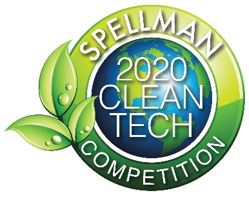Winners of the 2020 Spellman High Voltage Clean Tech Competition Announced
Hauppauge, NY – August 7, 2020 – Spellman High Voltage Electronics Corporation, the world’s largest independent manufacturer of custom high voltage power conversion products, is pleased to announce the winners of the 2020 Spellman High Voltage Clean Tech Competition, this year held virtually and streamed live on Zoom and Facebook Live.

The 20 finalist teams where from Canada, the United States (Arkansas, California, Colorado, North Carolina, Florida, Louisiana, Hawaii, Oregon, New Jersey, New York), Singapore, the Philippines and India. They competed for a share of the $60,000 in cash prizes.
“The students who participated this year did a remarkable job considering the challenges they faced during the global pandemic. At Spellman, we believe it is critical that we encourage young people to develop technology that will enhance the lives of people around the world. We are committed to this effort and making Spellman High Voltage’s sponsorship in this competition an integral part of our corporate mission,” said Dr. Loren Skeist, President of Spellman High Voltage Electronics. “There are so many challenges facing our world today. It gives us great hope when we see high school students from all around the world use their STEM skills to develop solutions that have the potential to make a real impact.”
The following are the top three teams in each category:
In the Limited Resources category, first-place recognition and a $10,000 prize was awarded to Joshua Parker of Kamehameha Schools Kapalama of team “Hawaiian Hydropower,” for his project relating to harnessing tidal currents that pass through Hawaiian fishponds to generate electricity. This is a link to the student explaining their project.
The second-place recognition in the Limited Resources category was awarded to Emily Anghad and Nafisa Azizi, students from Brooklyn Technical School of team “Project MIST,” who received 7,000 for their project relating to a faucet-attachable microplastic water filter to remove microplastics from drinking water. This is a link to the student explaining their project.
Ava Balacek and Giovanna Mayo, from team “AvaandGiovanna” from Manhasset High School in Manhasset, NY were given the third-place award in the Limited Resources category and $5,000 for their project, “The Removal of Methylene Blue from Wastewater Utilizing Iron Oxide Nanoparticles and Coated Sand.” This is a link to the student explaining their project.
Under the Abundant Resources category, first-place recognition and a $10,000 prize was awarded to Jasmine Li, a student from Fairview High School in Boulder, CO of team “solarjasmine,” whose project focused on making perovskite solar cells more energy efficient. This is a link to the student explaining their project.
The second-place finishers in the Abundant Resources category were Sanjna Kedia and Emily Ma, students from Manhasset High School in Manhasset, NY of team “sustainable_saviors,” who received $7,000 for their project relating to using a microbial fuel cell to remediate wastewater. This is a link to the student explaining their project.
Diya Desai, a student from Caddo Parish Magnet High School in Shreveport, LA, from team “Be the Change” was given the third-place award in the Abundant Resources category and $5,000 for her project which filters water through graphene oxide coated sand to remove heavy metal contaminants. This is a link to the student explaining their project.
“The U.S. and nations around the world must address the shortage of STEM educated people to fill millions of well-paying and rewarding jobs,” said Dr. Havasy, Executive Director of CSTL. “Despite the Covid-19 pandemic, our finalists demonstrated that when students are motivated to explore science, they will do amazing work. It is truly remarkable to watch students from around the United States and world share their similar concerns about the environment and show their commitment to STEM skills and knowledge to find solutions.”
In its ninth year, the Competition is the only outcome-based STEM focused research and design challenge for pre-college students in the world. The programs goal is to inspire young people to pursue STEM studies and careers. The program is managed by New York-based not-for-profit Center for Science, Teaching & Learning, led by STEM Crusader and Advocate Dr. Ray Ann Havasy, and sponsored by New York-based Spellman High Voltage Electronics, a leader in high voltage technology in the medical, industrial and scientific fields.
More than 744 students registered for the competition, comprising 395 teams, and of those teams 240 submitted projects for judging. This year’s competition theme, “Reducing Individual Impacts” focused on ways to change the course of our environmental future. Teams displayed their projects offering solutions to specific issues relating to climate change or protecting resources using clean technology.
For a full list of winners and teams click here.
For more information about, CSTL or the 2019 Spellman High Voltage Electronics Clean Tech Competition, please visit the Clean Tech Competition website or call (516) 764-0045.
About Spellman High Voltage Electronics:
New York-based Spellman High Voltage Electronics, a family owned company established in 1947, is the preferred global supplier of precision DC high voltage power supplies and Monoblock® X-Ray sources for medical, industrial and scientific applications. It currently has over 2,000 employees in five design, six production and eight support centers in North America, Europe and Asia. Spellman partners with leading technology companies to advance medical care, industrial processes, quality control, scientific research, security and telecommunications by providing innovative high voltage power conversion solutions. For more information about Spellman High Voltage Electronics, visit www.spellmanhv.com.
About the Center for Science Teaching and Learning:
The Center for Science Teaching & Learning (CSTL) is a not-for-profit organization with a mission of encouraging science learning and literacy. CSTL develops programs for people of all ages and utilizes inquiry-based learning as its foundation for program development. This year marks the second for which CSTL is serving as the administrator of the Clean Tech Competition..


